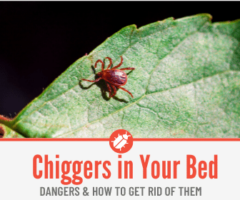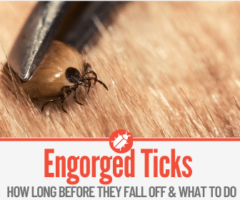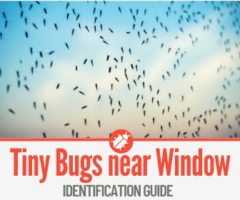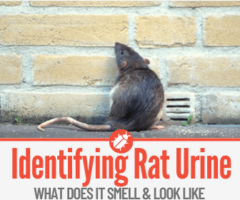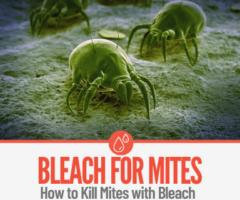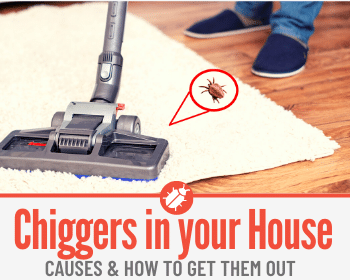 Wondering if Chiggers can get in your house? If so, what can be done?
Wondering if Chiggers can get in your house? If so, what can be done?
In this guide you will learn:
- How can Chiggers get in your house,
- Common Signs that you have Chigger in your house,
- How to Get Rid of Chiggers from your house,
- How to Identify Chigger bites & Prevent Chigger Infestation in your home.
Chiggers, the larval form of the harvest mite, are parasitic arachnids related to ticks and spiders. They can be a nuisance and a pest.
Can Chiggers Get Into My Home?
The short, and unpleasant, answer is yes. Chiggers can get inside your house.
The most common way for a chigger to find its way into your home is by hitching a ride, either on you or on your pets.
Humans generally don’t realize they have acquired these tiny hitchhikers at first, making it easier for chiggers to successfully hang on into your house.
In their larval stage, chiggers can live in your house for over two months (typically 50 to 70 days).
If they feed by biting you, your family, or your pets, they’ll be able to mature into adult.
The adults don’t bite humans and they don’t stick around. If they don’t feed in that initial time, they die off.
How Do Chiggers Spread in your Home…
During those 70 days of larval life, chiggers can spread anywhere you carry them in the house.
This includes, but is not limited to, carpeting, furniture, and bedding.
The good news is that they don’t breed in your house (and they don’t lay eggs in your skin, either, a common misconception that you can now stop worrying about), so their spread is limited to however many of them were initially brought into your home.
How to Tell If You Have Chiggers in Your House
Unfortunately, the surest sign of chiggers in your house will be chigger bites on the people and animals living in your home.
Chigger bites itch, they often turn red, and sometimes are raised or bumps.
Initially, you’ll find them most often in areas where your skin contacted the vegetation you picked them up from.
Finding the Chiggers in your home
Where do chiggers live indoors? Well, once they’re in your house, the chiggers are most likely to be found where you and your family or your pets go.
They rode in with you, after all, and you’re their food supply.
This means that once they are in your home, chiggers are likely to be found on furniture such as your couch or bed, or in the carpeting.
Continue Reading: Chiggers in Bed
How to Get Rid of Chiggers in Your House
There are a few ways to get rid of chiggers in your house.
Some are easy to tackle on your own and safe to take on with little expertise, some need a bit more care, and some involve financial investments ranging from small one-time purchases to paying for professional assistance.
1.Soap, hot water, and drying:
The easiest is washing chigger affected items with hot water and soap, and drying thoroughly.
Bed sheets and blankets, pillowcases, couch covers, towels and clothing that may have contacted infected areas should go into the wash.
Even pillows and rugs and perfect place for chiggers to thrive, if they have washing instructions that you can follow, should get the soap and water treatment, followed by thorough drying.
If possible, include even your shoes in this washing session if you suspect you might have chiggers in them. In every case, as per the washing instructions for each different item, use the hottest water that the items can safely be washed with.
When possible and safe to do so, use bleach as well, making sure to read all the directions before use.
This should not only kill the chiggers, it will also wash away the dead pests.
2.Clean and vacuum floors and carpets:
Cleaning a hard floor is pretty straightforward. A broom and dustpan, the floor cleaner of your choice and a rag or mop and bucket, and maybe a towel to dry it faster, and you’re good to go.
Cleaning a carpet from chiggers, beyond vacuuming, takes a little more effort.
There are a couple of ways you can give your carpet a good scrub to make sure the chiggers are gone. If you have more time and want to save money, there are a few methods for hand-washing.
(With any method of cleaning a surface that you’ve never tried before, test your clean-up plan on a small, out of sight area first to be sure that it won’t cause discoloration or damage.)
One way to hand-wash your carpet in a longer time frame but on the cheap is to mix one part white vinegar with three parts water in a bucket (or a big bowl if you don’t have a bucket).
Dip the bristles of a scrub brush into the mixture and rub them into the carpet to kill any chiggers in the carpet.
Don’t fully soak or saturate the carpet, but work the bristles and the mixture in well, then blot up excess liquid with a clean cloth or towel.
If this method doesn’t appeal to you, there are other hand-washing methods of deep-cleaning your carpet that are easy to look up. Just remember to follow directions and to test anything you try on a small area first.
If you have the ability, a tried-and-tested way to get your carpet clean is to rent or buy a steam-cleaner.
3.Steam clean your bed and soft furniture
Speaking of steam-cleaners, you can also clean your bed, your couch, and other soft furniture that may be infested with chiggers with a steam-cleaner, provided you follow all of the directions and take proper care while you do.
The hot steam kills chiggers as well as hot water does.
It may be important to note that most handheld steam-cleaners may lack the power to get the job done properly and get rid of chiggers completely.
4.Sulfur
If using sulfur to take care of your chigger infestation, it is very important to follow instructions for use, to wear any proper recommended safety gear, and to take all precautions with pets and children.
You can buy sulfur in a powder and sprinkle it on the infested areas, or in a sprayable form.
Sulfur is sometimes used to repel bugs and arachnids, but it can also irritate your throat, skin, and eyes, so be careful.
Oh, and sulfur is stinky. If you’re determined to use it to get rid of chiggers, don’t let the rotten-egg smell deter you too much.
Laundering your belongings should take care of that, and if you’re getting rid of a chigger infestation you should be making sure to do that anyway.
So if you use sulfur, maybe save the washing-everything step for last. Or better yet, repeat the washing as many times as needed.
5.Essential oils
Some people are hesitant to use sulfur, but want more to work with than only hot-water washing, steaming, and drying.
So, how to get rid of chiggers naturally without stinky sulfur?
There are essential oils that have been used as pest-repellants and will work on chiggers as well, and they certainly smell much better than sulfur.
Some of these oils are eucalyptus, peppermint, rosemary, and lemongrass, among a few others.
It’s possible, too, that you may be able to apply essential oils to your bedding or even your skin to keep the chiggers away.
If you do put any substance on something that you have prolonged contact with, like your bed, or if you put any substance on your skin, be sure to follow all instructions and take precautions, and test a small area of your skin first with only a small amount, to be sure that you won’t have an allergic reaction or other negative side effects.
6.Pest repellents
You can buy a variety of pest repellents, including sprays, sonic devices, powders, bug bombs, and more that will work for chiggers.
In all cases, study effectiveness and read the directions for use.
Improper use can make pest eradicating products range from useless to dangerous, so follow all instructions.
7.Hire an exterminator
If you don’t have time or don’t want to try methods you’ve never tested for getting rid of an infestation, you can always hire a professional to get the job done for you and get rid of the chiggers for you.
Will Chiggers Bite You if They Are in Your House?
There’s a common misconception that chiggers lay eggs in your skin. This is false. But they do, unfortunately, bite.
They do this no matter where they are, in your house or out of it, because this is how the chiggers feed.
When a chigger bites you, it injects a small amount of digestive enzymes (an ingredient in your stomach acid) into the skin, and then eats the resulting decomposing flesh.
That’s much less horrifying than it sounds—the worst most people experience from a chigger bite is itching and some redness and bumps.
The itching begins within a couple of hours of the bite and stops within a few days, and the red bumps vanish within a week or two.
Some people do experience a very rare reaction to chigger bites, as well as the bites of other pests like ticks and mites, and in these very rare cases a person can develop an allergy to red meat.
While this is possible, it is highly unlikely.
Signs of Chigger Bites
Itching is the first and most common sign of a chigger bite. The itch will peak within a day or two and then begin to fade.
Redness and bumps often appear as well, and take longer to fade.
If you’ve been bitten a few times instead of just once, the bites can sometimes be confused for other skin problems, like eczema.
Can chiggers bite my dog?
Chiggers can bite your dog. On the bright side, your canine companion’s fur is a pretty good defense against chigger bites, but it’s not one hundred percent protection.
Chiggers most commonly will bite where your dog’s fur is thinner, most likely the groin, belly, ears, and skin around the eyes.
Check your dog for signs of chiggers or their bites, and remove the pests if you see them.
This may be able to be done with a warm wet cloth or a vet-approved wipe. If the bites persist or you can’t get rid of the chiggers, take your pet to the vet.
Preventing Chigger Infestation in Your House
Keeping these pests out of your house starts with knowing where chiggers come from.
Chiggers thrive in shady vegetation and damp environments.
Think of creek beds, riverside areas, or fields.
(Which means, fortunately, your home won’t provide the environment the mature chiggers are suited for, or a place they want to have their babies.)
1.Contact-safe pest repellant
As noted earlier, some people use essential oils to repel chiggers. This method works as well on your person as it does on your bedding and furniture.
Again, be careful to follow instructions and avoid allergic reactions when using any substance directly on your body or clothing.
Commercial bug sprays should work as well, only use when following all directions.
2.Wear proper clothing
The number one way for chiggers to get into your home is on you or on your pets. So when you sally forth to spend time in the great outdoors, try to wear clothing that fits loosely and is made of tightly-woven fabric.
This combo is harder for the chiggers to get through, and keeps them further from your skin.
This makes it more likely for them to vacate your clothes—chiggers can live on your clothing just like they can in bedding or carpeting, but they’re not interested in your shirt, they’re interested in you.
Long sleeved shirts and long pants will serve you best. Tuck your shirt into your pants.
If you go out in boots, you should tuck your pants into your boots.
If you go out in sneakers, you could tuck your pants into your socks (this may look questionable from a fashion standpoint, but less questionable than the bites you’ll get from a chigger infestation).
It’s not a good idea to spend time in places you may find chiggers while wearing sandals.
3.Shower and wash up immediately
When you come home from time spent in potential chigger habitats, take a good hot shower, paying special attention to places chiggers may bite, such as your ankles, the backs of your knees and insides of your elbows, etc. Toss your clothes right into the wash, too.
If you brought a pet with you, give them a visual inspection.
Remember, chiggers will be attracted to the less furry parts of your animal friend, so you can check your pet’s groin, belly, ears, and eye areas to see if Fido needs a wash, too.
4.Yard maintenance can keep them out of your property
Keep your lawn mowed short, especially if it borders wilder areas like woods or a stream to keep the chiggers out.
Pull weeds regularly, and rake up leaves and brush routinely. Keep plants trimmed to prevent overgrowth.
If you can reduce shady areas in your yard, the bright sunlight will discourage chiggers, too.
Pesticides can be used, but should be done with caution.
Follow instructions, only apply to confirmed chigger infested locations, and keep all pets and children off of the yard and away from the affected area for as long as the pesticides remain active there.
You can also call a professional exterminator to take care of a confirmed chigger infestation for you.
Chiggers are a nuisance, but they can be dealt with.
Chigger infestations are bothersome. Their bites itch and look unpleasant.
They can live for over two months in your bed, carpet, and furniture, and they hitch a ride into your house on you or on your pet in the first place.
All that being said, they’re not dangerous. Feeling itchy can be maddening, but it’s unlikely to do you any lasting damage.
With a little elbow grease and hot water, or the right combination of budget and time, chiggers can be eradicated from both your body and your home.

